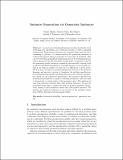Files in this item
Instance generation via generator instances
Item metadata
| dc.contributor.author | Akgun, Ozgur | |
| dc.contributor.author | Dang, Nguyen | |
| dc.contributor.author | Miguel, Ian James | |
| dc.contributor.author | Salamon, András Z. | |
| dc.contributor.author | Stone, Christopher Luciano | |
| dc.contributor.editor | Schiex, Thomas | |
| dc.contributor.editor | de Givry, Simon | |
| dc.date.accessioned | 2019-10-15T09:30:02Z | |
| dc.date.available | 2019-10-15T09:30:02Z | |
| dc.date.issued | 2019 | |
| dc.identifier | 261625085 | |
| dc.identifier | b1d1e65f-1ecf-4431-bc08-7cff9ef9b9dd | |
| dc.identifier | 85075734446 | |
| dc.identifier | 000560404200001 | |
| dc.identifier.citation | Akgun , O , Dang , N , Miguel , I J , Salamon , A Z & Stone , C L 2019 , Instance generation via generator instances . in T Schiex & S de Givry (eds) , Principles and Practice of Constraint Programming : 25th International Conference, CP 2019, Stamford, CT, USA, September 30 – October 4, 2019, Proceedings . Lecture Notes in Computer Science (Programming and Software Engineering) , vol. 11802 , Springer , Cham , pp. 3-19 , 25th International Conference on Principles and Practice of Constraint Programming (CP 2019) , Stamford , Connecticut , United States , 30/09/19 . https://doi.org/10.1007/978-3-030-30048-7_1 | en |
| dc.identifier.citation | conference | en |
| dc.identifier.isbn | 9783030300470 | |
| dc.identifier.isbn | 9783030300487 | |
| dc.identifier.issn | 0302-9743 | |
| dc.identifier.other | ORCID: /0000-0001-9519-938X/work/63045246 | |
| dc.identifier.other | ORCID: /0000-0002-1415-9712/work/63046290 | |
| dc.identifier.other | ORCID: /0000-0002-2693-6953/work/63046311 | |
| dc.identifier.other | ORCID: /0000-0002-6930-2686/work/68281473 | |
| dc.identifier.uri | https://hdl.handle.net/10023/18669 | |
| dc.description | Funding: UK EPSRC grant EP/P015638/1. | en |
| dc.description.abstract | Access to good benchmark instances is always desirable when developing new algorithms, new constraint models, or when comparing existing ones. Hand-written instances are of limited utility and are time-consuming to produce. A common method for generating instances is constructing special purpose programs for each class of problems. This can be better than manually producing instances, but developing such instance generators also has drawbacks. In this paper, we present a method for generating graded instances completely automatically starting from a class-level problem specification. A graded instance in our present setting is one which is neither too easy nor too difficult for a given solver. We start from an abstract problem specification written in the Essence language and provide a system to transform the problem specification, via automated type-specific rewriting rules, into a new abstract specification which we call a generator specification. The generator specification is itself parameterised by a number of integer parameters; these are used to characterise a certain region of the parameter space. The solutions of each such generator instance form valid problem instances. We use the parameter tuner irace to explore the space of possible generator parameters, aiming to find parameter values that yield graded instances. We perform an empirical evaluation of our system for five problem classes from CSPlib, demonstrating promising results. | |
| dc.format.extent | 2253105 | |
| dc.language.iso | eng | |
| dc.publisher | Springer | |
| dc.relation.ispartof | Principles and Practice of Constraint Programming | en |
| dc.relation.ispartofseries | Lecture Notes in Computer Science (Programming and Software Engineering) | en |
| dc.subject | Automated modelling | en |
| dc.subject | Instance generation | en |
| dc.subject | Parameter tuning | en |
| dc.subject | QA75 Electronic computers. Computer science | en |
| dc.subject | QA76 Computer software | en |
| dc.subject | DAS | en |
| dc.subject.lcc | QA75 | en |
| dc.subject.lcc | QA76 | en |
| dc.title | Instance generation via generator instances | en |
| dc.type | Conference item | en |
| dc.contributor.institution | University of St Andrews. Centre for Interdisciplinary Research in Computational Algebra | en |
| dc.contributor.institution | University of St Andrews. School of Computer Science | en |
| dc.identifier.doi | https://doi.org/10.1007/978-3-030-30048-7_1 |
This item appears in the following Collection(s)
Items in the St Andrews Research Repository are protected by copyright, with all rights reserved, unless otherwise indicated.

